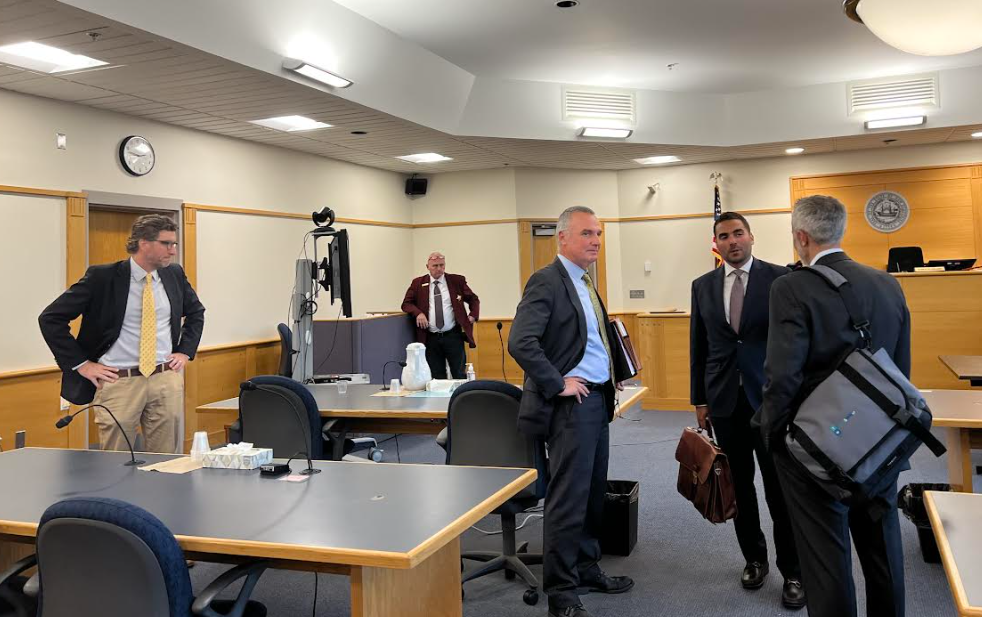By NANCY WEST, InDepthNH.org
BRENTWOOD – The judge in the defamation lawsuit Eric Spofford filed against New Hampshire Public Radio for the story alleging he engaged in sexual misconduct when he owned Granite Recovery Centers said he found no “actual malice” in their reporting.
Rockingham County Superior Court Judge Daniel St. Hilaire said he therefore would not turn over to the parties the nearly 3,000 documents detailing NHPR’s reporting on the March 22, 2022 story about Spofford after reviewing them confidentially in camera.
Spofford sought the documents to prove “actual malice,” but St. Hilaire found nothing to back up that claim.
“In short the in camera review documents reflect professional and diligent reporting, and are totally devoid of any evidence that the NHPR defendants had reason to doubt the truth of their publication.”
“While Spofford maintains that the accusations against him are baseless and entirely fabricated, the in camera review documents contain absolutely no evidence of falsity. On this record, Spofford has no viable basis to sue NHPR or their sources for defamation,” St. Hilaire wrote in his Dec. 13 order.
St. Hilaire deemed Spofford a public official or public figure in this action which would require of plaintiffs that “he or she must prove the statement was made with ‘actual malice’ meaning with knowledge that the statement was false or with reckless disregard of whether it was false or not.”
Reckless disregard for the truth will be found only where there “is a subjective awareness of probable falsity. There must be sufficient evidence to permit the conclusion that the defendant in fact entertained serious doubts as to the truth of their publication.
“On the contrary Spofford’s assertion of actual malice has no merit as compared to the depth, detail, and accuracy of (senior reporter Lauren) Chooljian’s investigation as reviewed by the court,” St. Hilaire wrote.
St. Hilaire said Spofford is still free to amend his original defamation complaint within 30 days.
However, “absent any new evidence that constitutes a total departure from the in camera review materials, any amendment will likely be futile,” St. Hilaire wrote.
Spofford’s attorney Michael Strauss didn’t immediately respond to a request for comment. NHPR’s attorney Sigmund Schutz declined to comment.
Chooljian’s notes and communications constantly referenced the need to speak to other sources to provide corroboration and verification of the accusers’ stories, St. Hilaire wrote.
She interviewed dozens of sources for these purposes, St. Hilaire said.
Chooljian was also assisted by senior reporter Jason Moon, editor Dan Barrick and other members of NHPR staff who were similarly concerned with veracity and corroboration, St. Hilaire said.
Spofford filed the lawsuit Sept. 20, 2022 in Rockingham County Superior Court claiming the story and podcast defamed him and damaged his reputation by falsely claiming he sexually assaulted two former employees and sexually harassed a client the day after she left treatment. NHPR stood by its reporting.
“On March 22, 2022, NHPR published a hit piece about Eric. The clickbait title used — He built New Hampshire’s largest addiction treatment network, Now, he faces accusations of sexual misconduct—amounted to a claim that Eric had been criminally charged for committing sex crimes,” Spofford’s lawsuit claims.
“From top to bottom, both the article and the podcast falsely state and imply that Eric sexually harassed one woman (pseudonym, “Elizabeth”) and sexually assaulted two others (pseudonyms, “Employee A” and “Employee B”),” according to the lawsuit. Spofford denied the allegations and was never charged with any such crimes.
The lawsuit also sued three sources NHPR used in reporting the story.
Spofford was well-known in New Hampshire, especially in the recovery community as a long-term recovering heroin addict who built the state’s largest addiction treatment network, which he sold to a Texas-based treatment company in 2021 for an undisclosed price.
Chooljian has recently done a podcast called The 13th Step.





